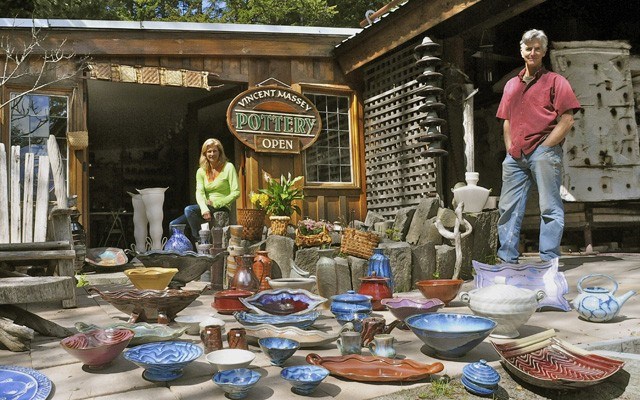For years, local artist and gallery owner Vincent Massey has been asking the municipality to allow him to sell his work from his home studio in Alpine Meadows, and, today, he finally feels like his voice is being heard.
"I feel really good," he says of the municipality's recognition of the local art community's concerns. "I plan to be here for the long term and have a home-based studio that, I don't know if it's been short shrifted, just not acknowledged (before)."
Massey, who has operated the Vincent Massey Pottery Gallery with his wife Cheryl for close to 30 years, was one of over a dozen local artists gathered at Millennium Place Monday, April 13 to discuss ways the Resort Municipality of Whistler (RMOW) can strengthen cultural tourism offerings.
The forum focused on three key initiatives: providing opportunities for home-based art studios; exploring the potential for artisan markets; and utilizing existing cultural facilities.
In the wake of 2013's Community Cultural Plan, and the incoming Audain Art Museum serving to shine a light on the arts in Whistler, the cultural community is "poised for growth" says Anne Popma, the resort's cultural officer.
"The opening of the Audain Museum will be a lightning rod for people," she adds.
"It's an opportunity for us as a cultural sector to coordinate our efforts to take advantage of the large number of media that will be here. Just as they did in the Olympics, when they turned around and wanted to know what else was going on in town, the same thing is going to happen with the Audain Museum."
Popma also applauds local government for listening to the arts sector and taking action on a number of cultural initiatives.
"When I think of the cultural landscape when I first came to Whistler over 25 years ago, I must say there's been a huge growth in the understanding in (municipal) hall of the potential of cultural tourism and growth in the cultural sector," she says.
For Massey, that understanding is reflected in the RMOW's willingness to consider allowing art sales from home studios, as well as permitting signage pointing visitors to his gallery. Other ideas floated included the creation of an annual art studio crawl and the development of self-guided home-studio tours.
Massey commended Popma for pushing for those and other key recommendations out of the cultural plan towards implementation.
"Anne Popma was absolutely the perfect person to hire," he says. "She's an artist and a long-term local, so she understands these issues."
Other discussions on Monday centred around leveraging the eight existing cultural facilities owned by the RMOW for use by local artists and cultural creators — an issue near and dear to Stephen Vogler's heart. The chairman of The Point Artist-Run Centre, which is municipally owned, Vogler is hopeful he can enter into a long-term operating agreement with the RMOW for use of the Alta Lake facility. Vogler currently rents the centre for events as they come up.
"What came out of that yesterday and what we've said over and over, is that what we need right now... is a longer-term commitment in terms of operating agreements so we know we are there and we can plan further ahead and have a sense of more permanency," Vogler says.
The municipality is exploring the potential for a regular artisan market for local artists to sell their wares as well.
Artists in attendance also proposed creating an arts festival modelled after similar events across B.C., like West Vancouver's Harmony Arts Festival, which attracts over 130,000 visitors across 10 days each summer.
The key, according to Vogler, is to allow Whistler's cultural sector dictate the direction of any arts-focused event.
"I really think those (events) emerge best from the cultural creators at the grassroots, or private organizers, and I think the municipality's role is to try to facilitate them by writing policy and regulations and (providing) a little bit of support here and there with a bit of nurturing and seed money," he says.
"Culture grows best from the bottom up, and Whistler does sometimes tend towards a bit of a top-down approach."




